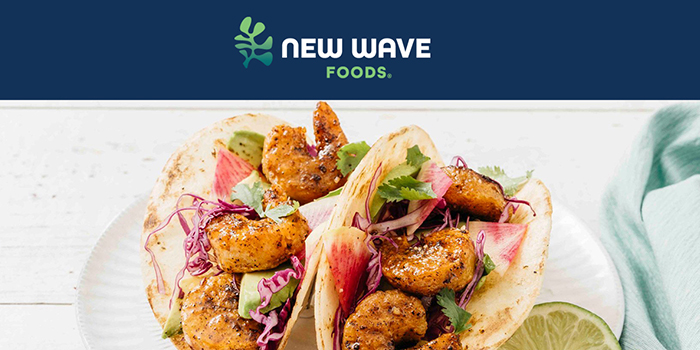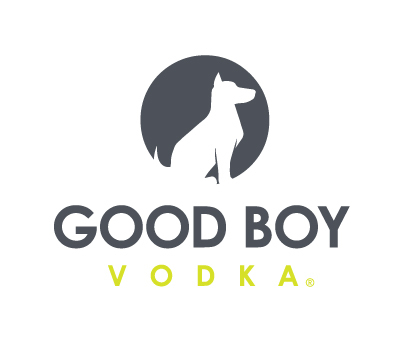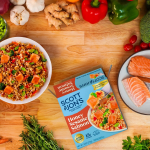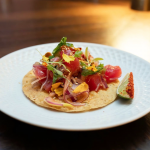New Wave Foods Raises $18M, Readies for Foodservice Launch

Plant-based seafood brand New Wave Foods announced this week the close of an $18 million round of funding as the brand prepares to “disrupt an enormous market” with its seaweed-based shrimp alternative. New Wave plans to launch the line later this year.
New Enterprise Associates (NEA) led the round, with NEA general partner Liza Landsman joining the company’s board of directors as part of the deal. Other participants in the round include former Beyond Meat investor Evolution VC Partners, among other new and existing investors, such as Tyson Foods. One of the largest protein producers in the world, Tyson previously also took part in the brand’s 2019 funding round.
Founded in 2015 by Michelle Wolf, a 2021 Forbes 30 under 30 honoree, and oceanographer Dominique Barns, New Wave seeks to produce sustainable, plant-based versions of what it says are overfished, environmentally threatened shellfish products. The company is first tackling shrimp, which tops canned tuna and salmon as the most consumed marine seafood in the U.S., according to the National Marine Fisheries Service. New Wave’s seaweed and mung bean-based shrimp has zero cholesterol and fewer calories than ocean shrimp, and is free of shellfish or soy allergens, according to the company.
According to CEO Mary McGovern, New Wave plans to use the funding to scale its production and expand sales and marketing efforts as it prepares to launch into restaurants and foodservice, a channel which accounts for approximately 80% of the shrimp consumption in the U.S., she said. Its first shrimp offering, which is sold “raw” and can be cooked like traditional shrimp, will be an “unadorned” larger shrimp, which can serve as the base of a variety of entrees. In the next year, the company plans to launch smaller, appetizer-sized “popcorn” shrimp and then a breaded variety.
The company claims that its shrimp products will be priced at wholesale similar to premium shrimp.
Many plant-based meat alternatives have also pursued food service as a launching platform, but most have either focused on being “chef driven” or, alternatively, taking a more mass appeal, targeting as many consumers as possible. McGovern said the company hopes to first launch the shrimp in national and regional chains, with colleges and universities also an attractive target. A packaged product will follow later.
“We’ve always known that food service was the best way to introduce it, to have it served,to experience it in a range of dishes,” she said. “Eventually it will make its way, I think, into home cooking, but that’s 20% of the market. So it will follow in due course.”
The shrimp begins shipping to its foodservice distributor this month, and should hit menus in the second quarter of this year, McGovern said, with its footprint set to grow more expansively in the second half of the year. While the foodservice channel has taken a hit amid COVID-19, McGovern said she anticipates a “huge rebound” later this year, and said she’s found that foodservice accounts are “looking for innovation” to welcome back diners and attract new consumers.
While several plant-based seafood brands that have recently garnered investor and consumer interest, such as Good Catch, produce plant-based canned or frozen tuna or crab, New Wave is among very few offering plant-based shrimp as its marquee product.
McGovern attributes this lack of competition to the lengthy and challenging development process for the shrimp. It took five years and $8 million for New Wave to formulate its own shrimp alternative, she said. Simulating the “multi-textured experience” of shrimp is particularly challenging, compared to formulating a single-textured plant-based fish, McGovern said. Even most meat alternatives have first launched with grounds or sausages rather than replicating whole cuts of meat. Yet, this complexity can also serve as a moat, giving New Wave an edge over other plant-based seafood brands as well as other plant-based shrimp offerings currently in the market.
“This has been incredibly difficult, which gives us both incredible opportunity and it provides terrific competitive insulation,” she said. “The bar has been very high. We have patents, we have trade secrets, we protect our formula like Coca-Cola syrup. We have very high barriers to entry that we’ve created around this.”
It’s also one of the few seafood alternatives where pricing will match that of the conventional product. Pricing has been a sticking point for some other brands which are targeting cheaper seafood categories, such as canned tuna.
Ultimately, New Wave aims to create a plant-based shellfish platform, launching other seafood alternatives including lobster, scallops and crab, according to McGovern. Each will follow the same distribution strategy of launching first in food service before targeting consumers directly. Still, the company doesn’t see itself as simply an ingredient brand and wants to build brand awareness. As such, New Wave has invested in its own branding and marketing strategy and will look for restaurant partners who can help build that awareness through marketing and menu callouts. It’s a strategy that was successfully utilized in the beef alternative segment by brands such as Impossible Foods and Beyond Meat, who established name recognition in the foodservice space and “revolutionized” the plant-based burger space, delivering a taste and texture to diners that veggie burgers that came before didn’t, McGovern said.
“What we’re bringing is not just a plant-based shrimp and plant-based shellfish, but we’re going to define it, it’s New Wave Shrimp, it will be New Wave Lobster, New Wave Crab, so that we are moving in while there is still open turf,” she said. “We’re going to build and are building a branded plant-based shellfish company.”
















